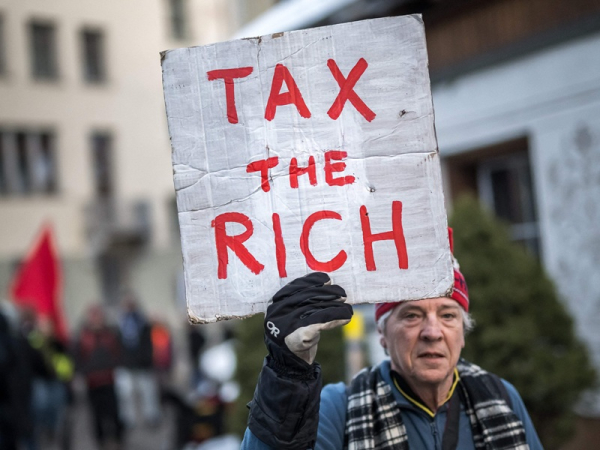
Phil White, a founding member of Patriotic Millionaires, held a sign urging lawmakers to “tax the rich” during a demonstration coinciding with the annual meeting of the World Economic Forum (WEF) in Davos, Switzerland, on 19 January 2025. A newly published report indicates that Finland is particularly vulnerable to losing tax revenue due to the capital gains tax breaks offered by several countries in Europe. (Fabrice Coffrini – AFP / Lehtikuva)
- Next Article Over 100 Finnish artists call on Yle to boycott Eurovision
FINLAND is especially vulnerable to tax revenue losses caused by tax benefits designed to attract wealthy individuals from abroad, concludes a report published on Tuesday by Kalevi Sorsa Foundation and European Progressive Studies.
The report examined the taxation of capital gains in 15 countries across Europe.
Lauri Finér, the chief operating officer at Kalevi Sorsa Foundation, on Tuesday revealed in a press release that 11 of the countries have introduced various tax benefits for investment returns.
Spain, for example, allows foreign nationals to receive capital gains from abroad without any tax repercussions. Malta, meanwhile, enables wealthy foreign nationals to buy tax citizenship by making a real estate investment of 275,000 euros, a status that guarantees a flat tax rate of 15 per cent on capital gains received from abroad. In Italy, wealthy foreign nationals can opt to pay an annual lump sum of 100,000 euros to avoid even substantial capital gains liabilities.
“Finland stands out in the report as a country that is especially vulnerable to tax losses caused by tax benefits in other countries. Capital gains generated here can be withdrawn in countries with low tax rates with the help of insurance wrappers and holding companies, for example,” said Finér.
“You can say that paying taxes has been made at least partly voluntary for the wealthiest Finns.”
Unlike many other countries assessed in the report, Finland does not prevent transnational tax avoidance by taxing the appreciation of assets. The country has also facilitated tax avoidance by entering into bilateral tax agreements that deviate from recommendations with countries such as Switzerland, the UK and United Arab Emirates.
Another anomaly is the preferential tax treatment of dividends paid out by unlisted companies.
The report also found that capital gains taxes on individuals have become a focal point of tax competition following attempts to weed out tax avoidance by corporations, such as the establishment of a 15 per cent minimum tax rate on large corporations in 2024.
Finér on Tuesday told Helsingin Sanomat that in general the introduction of schemes that facilitate tax avoidance result in more people avoiding taxes.
“After you addressed the other [issues], tax competition moved to the weakest point in the chain. The dynamics of tax avoidance and tax planning work so that if a particular country has a low tax rate, the money will find its way there,” he said to the newspaper.
Finér encouraged lawmakers to continue stepping up regulation and monitoring to plug the loopholes. The EU, he added, should also introduce a minimum tax rate at least on the largest capital gains, including on US investors receiving dividends from member states.
“It could be complemented with a minimum tax on the super rich,” he proposed.
The recommendations would also address problems associate with the concentration of wealth, which have been highlighted recently by Nobel laureate in economics Daron Acemoglu and ex-US President Joe Biden. In Finland, similarly to most other countries in Europe, the wealthiest pay proportionally less taxes than middle-income earners.
“It is untenable that the richest pay less taxes than others,” Finér stressed.
Finér, formerly a tax specialist at the Social Democratic Party, co-authored the report with Niko Pankka, the head of public affairs at the Central Organisation of Finnish Trade Unions (SAK). Kalevi Sorsa Foundation is a social democratic think tank promoting a just ecological transition based in Helsinki, Finland.
Aleksi Teivainen – HT
- Next Article Over 100 Finnish artists call on Yle to boycott Eurovision
Source: www.helsinkitimes.fi
